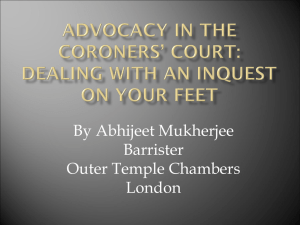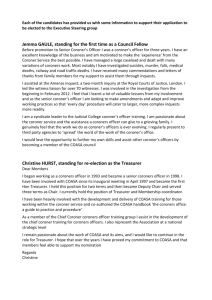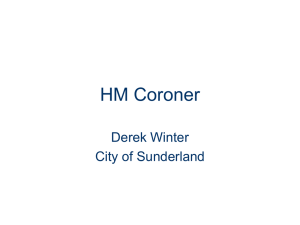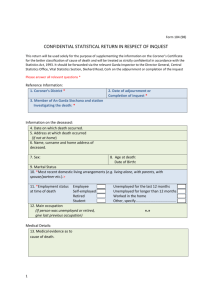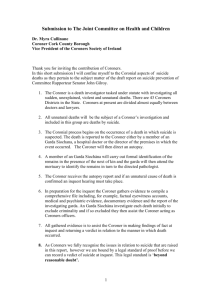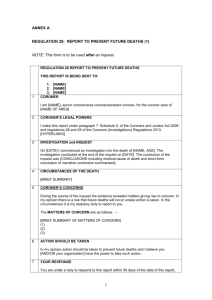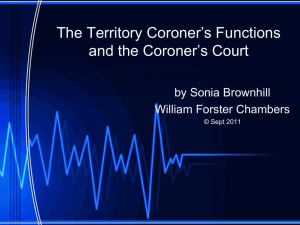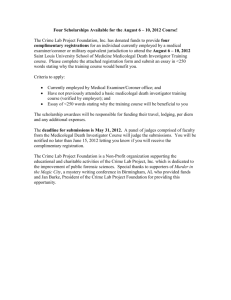Opening statement by Michael Finucane solicitor
advertisement
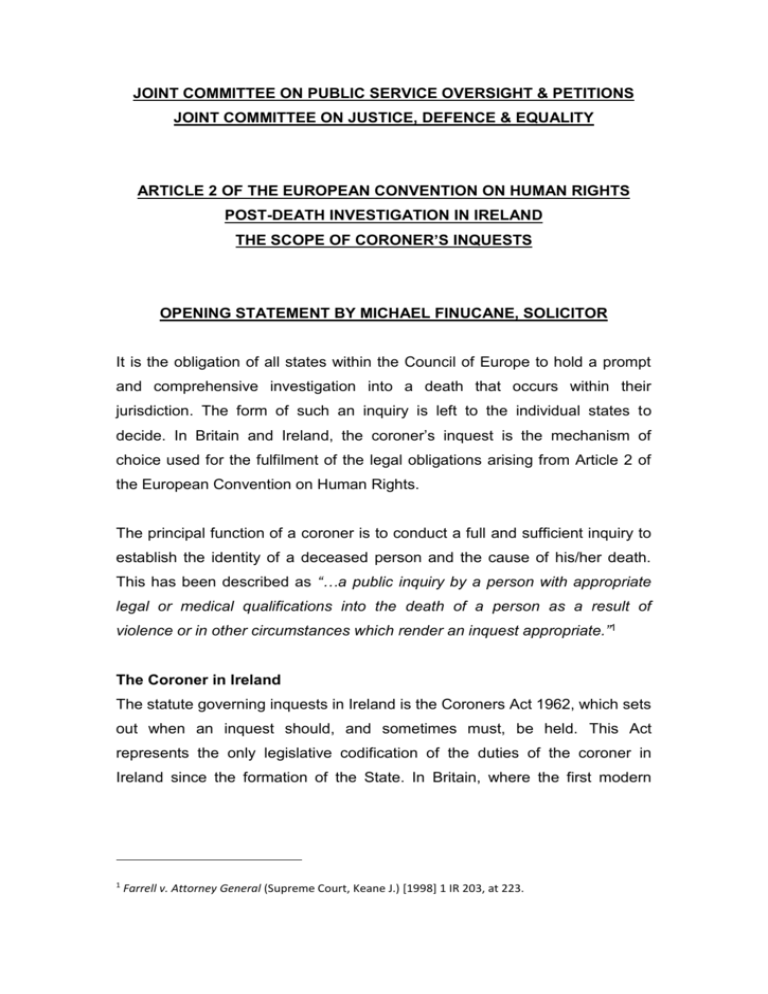
JOINT COMMITTEE ON PUBLIC SERVICE OVERSIGHT & PETITIONS JOINT COMMITTEE ON JUSTICE, DEFENCE & EQUALITY ARTICLE 2 OF THE EUROPEAN CONVENTION ON HUMAN RIGHTS POST-DEATH INVESTIGATION IN IRELAND THE SCOPE OF CORONER’S INQUESTS OPENING STATEMENT BY MICHAEL FINUCANE, SOLICITOR It is the obligation of all states within the Council of Europe to hold a prompt and comprehensive investigation into a death that occurs within their jurisdiction. The form of such an inquiry is left to the individual states to decide. In Britain and Ireland, the coroner’s inquest is the mechanism of choice used for the fulfilment of the legal obligations arising from Article 2 of the European Convention on Human Rights. The principal function of a coroner is to conduct a full and sufficient inquiry to establish the identity of a deceased person and the cause of his/her death. This has been described as “…a public inquiry by a person with appropriate legal or medical qualifications into the death of a person as a result of violence or in other circumstances which render an inquest appropriate.”1 The Coroner in Ireland The statute governing inquests in Ireland is the Coroners Act 1962, which sets out when an inquest should, and sometimes must, be held. This Act represents the only legislative codification of the duties of the coroner in Ireland since the formation of the State. In Britain, where the first modern 1 Farrell v. Attorney General (Supreme Court, Keane J.) [1998] 1 IR 203, at 223. Coroner’s Act was enacted in 18432, successive legislation has been passed to update the office and duties of the Coroner on a continual basis. The effect of rulings by the European Court of Human Rights on British law – and those of England and Wales in particular – led to modifications in line with what has been identified as the ‘procedural obligation’ arising from Article 2 ECHR. The most recent is contained in the Coroner and Justice Act 2009, which was implemented in England and Wales on 25 th July 2013. This legislation supplements the influences on inquests and post-death investigations in England & Wales that are to be found in other legislation such as the Human Rights Act 1998 and the Inquiries Act 2005. The only substantive reform of the law on coroners and inquests in Ireland in recent decades is the Coroners (Amendment) Act 2005, which repealed the prohibition on the calling of more than two registered medical practitioners to give evidence during an inquest (s.26). The Act also empowered a coroner to issue witness summonses to persons essential to the inquiry and increased the punitive sanctions in the event of non-attendance. Domestic Law The Supreme Court has identified five principal interests for an inquest to address beyond the obvious questions of whom, when and how. These are: 1. To determine the medical cause of death 2. To allay rumours and suspicion 3. To draw attention to the existence of circumstances which, if left unremedied, might lead to further deaths 4. To advance medical knowledge 2 The earliest ‘statutes’ dealing specifically with the office of coroner (or ‘Crowner’) date from the 13th Century, e.g. De Officio Coronatoris (Office of Coroner) Act, 1276. See Jervis on Coroners, 12th ed., Matthews, P. (2006, London, Sweet & Maxwell). 5. To preserve the legal interests of the family of the deceased, or heirs or other interested persons.3 More recently, the Supreme Court has gone further about the nature of inquests as investigative vehicles and outlined some of the parameters of legitimate inquiry under the current system. In Ramseyer v. Mahon, the Supreme Court confirmed that the entitlement of an interested party to information held by the coroner did not have the effect of converting an inquisitorial hearing into an adversarial one. It was confirmed also that, if an interested party has a theory about how a death occurred, then the inquest is the place to test it: “Facts themselves are not entirely neutral. They are often pregnant with implications... It is in no way inconsistent with the inquisitorial character of an inquest that persons with a legitimate interest should propound a version of the facts which accords with those interests. One may wish to seek to establish facts tending to deflect blame; one may wish to pursue a version which tends to suggest that the death occurred other than due to mere accident or natural causes; one may simply wish to have a verdict which is neutral as regards any such considerations. All of these respective considerations are legitimate.” 4 Functions of the Coroner The duties of the coroner may be divided broadly into two categories. The first is administrative and includes the creation, collation and preservation of death records. They will also include notification of various parties with an interest in or statutory obligation arising from the death of an individual. The coroner will, in most cases, be responsible for: 3 Report of the Broderick Committee on Death Certification and Coroners Inquests (London) House of Commons, Cmnd. 481. Cited with approval by Keane J., Farrell v. Attorney General (Supreme Court), supra, note 2, at 224. 4 Fennelly J., Ramseyer v. Mahon (Supreme Court) 1 IR 216, at 224-225. informing next of kin or family and other interested persons of a death arranging for the removal of a body to the mortuary the holding of an autopsy liaising with the chief state pathologist or other person designated to carry out an autopsy liaising with external investigators such as Gardaí, Garda Ombudsman or other investigative bodies, eg. HSE These tasks completed, the second aspect of the coroner’s duties, those of independent investigator, will commence. It is in this regard that most problems with the current regime in Ireland will arise, insofar as the ability (in terms of resources) and investigative remit of coroners tend not to be able to address the concerns of next of kin and family in disputed or controversial cases. This is why the current regime is often criticised as not fulfilling the requirements of the European Convention and leaving Ireland in breach of its obligations under Article 2. Requirements of Article 2 ECHR The European Court of Human Rights set out, in a series of cases decided in 2001, five basic principles that would be required to be met in order for an investigation to be ‘Article 2 compliant’. In general, these can be summarised as follows: 1. The investigation must be prompt 2. The investigation must be public 3. The investigation must be independent 4. The investigation must be effective 5. The investigation must include the next of kin and/or family to a sufficient extent to protect their legitimate interests5 5 Jordan v. United Kingdom, Kelly & Ors v. United Kingdom, Shanaghan v. United Kingdom, McKerr v. United Kingdom (2001) 37 EHRR 52. The Court also made it clear that member state authorities would be required to act of their own motion: it was not for the bereaved relative to act as the driving force. Overall, the manner in which the Court addressed the many facets of postdeath investigations made it clear that a new legal order was required. Deaths in custody, for example, could no longer be investigated by the custodial agency itself, even if the people doing so came from another station or another district. If this meant that an existing bureau would now have to be tasked with carrying out such investigations then this is what would be required. If such a body did not exist then Member States would have to create one, such as a police or prisons ombudsman, both of which now exist in Northern Ireland and Britain. In terms of investigations into deaths by other agencies, such as the Director of Public Prosecutions, the requirements of the procedural obligations enumerated under Article 2 would require change in the way criminal cases were investigated and prosecuted. Since October 2008, as a result of the decision of the European Court in Jordan, the Director of Public Prosecutions in Ireland now gives reasons for a decision not to prosecute in fatal cases involving murder, manslaughter, infanticide, workplace fatalities and fatal road traffic accidents.6 However, problems remain in the course of investigation of various types of deaths that trigger the Article 2 obligation. Promptness & Public Scrutiny When a death occurs in Ireland, there is typically a Garda investigation, which may lead to the prosecution of a person or persons if the circumstances of the death are found to be criminal in nature. Under the Coroners Act 1962, a coroner is obliged to postpone the inquiry into the death until the Garda 6 Report on Prosecution Policy on the Giving Reasons for Decisions, Office of the DPP (Dublin) 22 October 2008 https://www.dppireland.ie/filestore/documents/FINAL%20REPORT%20201008.pdf investigation is complete and the matter has been considered by the DPP. 7 In some cases, the delay in holding the inquiry that is caused by a lengthy Garda investigation and a slow process of review by the DPP raises concerns among relatives of the deceased. In addition, the fact that the coroner has no discretion to proceed with the inquiry pending the outcome of the consideration of criminal proceedings can lead to possible breaches of Article 2 ECHR, since the requirements of promptness and public scrutiny are not fulfilled by the internal Garda/DPP process. Independence & Effectiveness The lack of resources afforded to coroners in Ireland to carry out their investigative functions is a cause for concern and may well lead to breaches of the ECHR procedural obligation in multiple cases. Previously, the office of the coroner in any given district would rely on the local Gardaí to investigate a death, preserve evidence and take statements. This facilitated independent investigation up to the point where the death in question was caused by the Gardaí themselves or occurred during a custody situation. Problems of independence, actual and institutional, were unavoidable but these appear to have been addressed through the establishment of the Garda Ombudsman. However, problems still exist when deaths occur in other types of state institutions, particularly psychiatric units, state-run hospitals and juvenile facilities. These types of deaths do not always contain an obvious criminal element and the role of the Gardaí can be limited. In the absence of professional police investigators, the coroner is often left badly underresourced when it comes to investigating the circumstances of a death in a medical scenario. The death may be left in the hands of the health authorities, such as the HSE and sometimes even the hospital authorities themselves, which is often not effective and never properly independent. The next of kin and relatives of the deceased may be afforded an opportunity to speak to hospital administrators about the death and occasionally the treating doctors 7 Sections 25 (1) and 25 (2) Coroners Act 1962. but experience shows that this interaction can be limited. It is extremely rare, however, that relatives would be given access to documentary information or internal reports on the circumstances of a death, almost to the point of virtual exclusion. The only stage at which this happens is at the inquest, which may occur a long time after the death. Once again, the requirements of promptness, involvement of the next of kin and family are not observed properly, as well as unacceptable limitations on the requirements of independence and effectiveness. Effectiveness: a measure of means, not result Following the modification of the law in England and Wales, there have been a number of instances of prosecutions being instituted following verdicts from coroners’ juries. In one such case, a verdict of unlawful killing led to the successful prosecution of a hospital trust over its criminally negligent storage procedures that led to a patient being administered a powerful anaesthetic instead of a saline drip.8 Under the law as it currently stands in Ireland, a coroner would find it virtually impossible to conduct an investigation of this type into a death in medical surroundings, even if they had the resources to do so. Verdicts that criticise the actions of agencies or individuals within those agencies, such as ‘neglect’ or ‘failure of discharge responsibility’, are precluded by the Coroners Act.9 This means that the investigation is, ultimately, not effective, since it cannot hold anyone responsible for the death. The inquiry before the coroner and jury can often be reduced to little more than an insipid review of documents and questioning of witnesses with no meaningful conclusions being reached and thus diluting its effectiveness considerably. In this regard, the state’s investigative obligations are not being adequately met by the current system. 8 In the first case of its kind, the Great Western Hospitals NHS Foundation Trust (Swindon & Marlborough) was fined £75,000 for gross negligence leading to the death of Mayra Cabrera, who had just given birth to a baby boy, who survived. The trial court heard that “chaotic” procedures for storage of drugs in the hospital, which had been previously noted in 1994 and 2001, led to a mix-up between an epidural anaesthetic and saline solution. See The Guardian, 05 February 2008: http://www.theguardian.com/society/2008/feb/05/nhs.health1 9 See sections 30 and 31, Coroners Act 1962. Conclusion It is clear from the decisions of the European Court in 2001 and subsequently that the process must be geared towards reaching a conclusion that has meaning and purpose. It cannot be reduced to an exercise of mere academic or theoretical review. In summary, it is my conclusion that the framework legislation for coroners inquests requires to be overhauled and updated as a matter of urgency and a new statute enacted as soon as possible. Michael Finucane, Solicitor Dublin 10 June 2015
